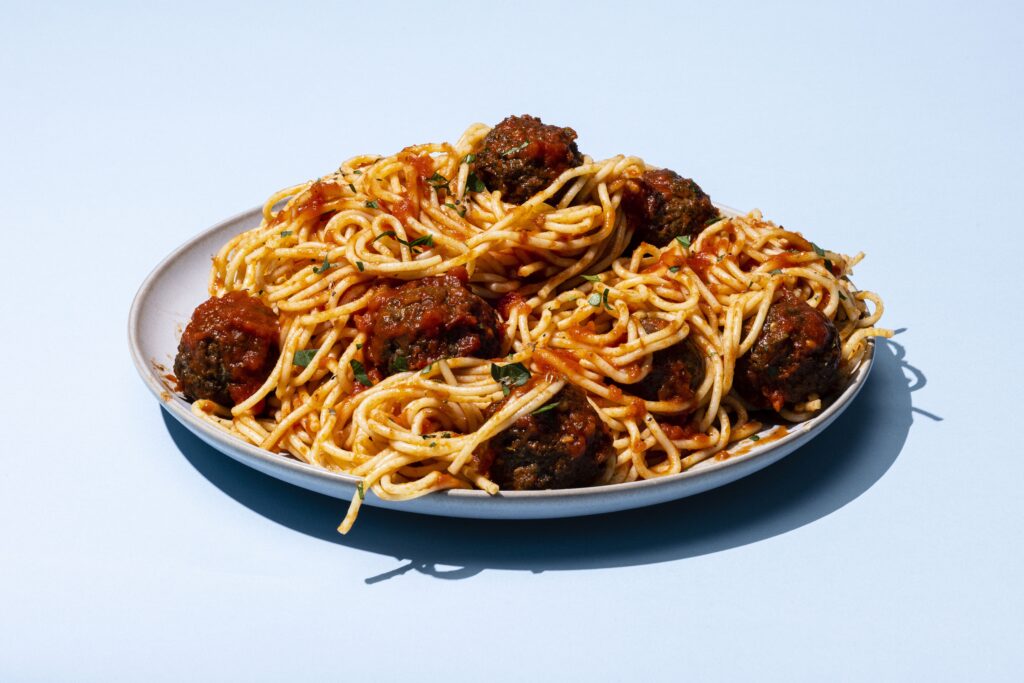‘Cultivating Ignorance’: Italy Passes Law to Become the First Country to Ban Cultured Meat
8 Mins Read
It has been in the making for a while, but Italy has officially passed the law that bans the production and sale of cultivated meat within the country, with the far-right government citing health reasons, a risk to the country’s tradition, and a need to safeguard the livestock industry. The move also bans the use of meat-related terms such as ‘steak’ and ‘salami’ on plant-based meat product labelling.
Italy’s lower house of parliament has approved a bill by its agriculture minister to ban the sale and production of cultivated meat in the country, making it the first to do so. The law, which includes a plant-based meat labelling ban, has introduced fines between €10,000 and €60,000 for each violation.
The law described non-traditional foods like cultivated meat and insect protein as a threat to Italy’s food culture. This has been a familiar rhetoric ever since Prime Minister Giorgia Meloni and her far-right Brothers of Italy party gained power in the centre last year, and the latest move has already attracted controversy from multiple corners across Europe.
Agriculture minister Francesco Lollobrigida – who is Meloni’s brother-in-law – called the ban a “brave measure demanded by citizens . . . that puts Italy at the vanguard of the world”. In a Facebook post, he said: “We are the first nation to ban it, with all due respect to the multinationals who hope to make monstrous profits by putting citizens’ jobs and health at risk.”
Lollobrigada brandished two members of the left-wing Più Europa party – who were protesting in front of the parliament with signs like “cultivating ignorance” and shouting “shame, shame” – as “clowns”. Italy’s opposition has criticised the move as “ideological propaganda”.
Industry body the Italian Alliance for Complementary Proteins said this bill “tells Italians what they can and can’t eat, stifles innovation and likely violates EU law”. Italy may not be able to impose the ban on the sale of cultivated meat produced within the EU, as its common single market enables the free movement of goods and services.
How Italy’s cultivated meat ban took shape

There was noise about a potential ban as early as last year, when one of Italy’s largest farming associations, Coldiretti, launched a petition for a prohibition of “synthetically produced food”, which included “laboratory-produced meat to milk ‘without cows’ to fish without seas, lakes and rivers”. It attacked the use of fetal bovine serum – something more and more producers are moving away from – in the production of cell-cultured meat, calling it unnatural.
The petition bagged nearly half a million signatures, as well as the support of 3,000 local and regional governments. Then, in March, Italy’s senate approved a bill to put the ban into effect, with 60% of senators voting in favour and citing national heritage and human health concerns.
Italy submitted a Technical Regulations Information System (TRIS) notification to the EU – a procedure aiming to prevent the creation of barriers between EU countries. This meant that the country needed approval from the bloc if it wanted to ban cultivated meat, with other EU members getting the chance to weigh in on the decision as well.
Last month, however, Italy withdrew this notification, as it knew that the proposal would be rejected by the EU. Claudio Pomo, development manager at animal rights group Essere Animali, noted at the time: “What happened is certainly an important result, but it is not yet a definitive victory, and we must not let our guard down. Minister Lollobrigida has already said that he wants to move forward with this battle, and there will certainly be other moves.”
And there certainly have been. Just last week, Lollobrigada doubled down on this stance, confirming the country wants to be the first to ban cultivated meat. Speaking to Politico after the bill was passed, he said: “If you produce a food that has no relationship to man, land, work, you can move production to a place with lower taxes and less environmental standards, hurting jobs and the environment.”
The ban also prohibits plant-based companies from using words like ‘steak’, ‘salami’ on vegan meat alternatives, which alt-protein think tank the Good Food Institute (GFI) Europe says are consumed by half of Italy’s population. The country boasts the third-largest plant-based market in the EU, with a 21% sales hike from 2020-22.
“Eliminating the possibility of using familiar terms to facilitate product recognition undermines transparency, generating confusion for consumers where none currently exists, as demonstrated by surveys,” said GFI Europe’s public affairs consultant, Francesca Gallelli.
Misinformation about health risks

Lollobrigada reiterated the government’s intention to “defend our civilization against a model driven by delocalisation and long supply chains”. This is despite Italy having a self-sufficiency rate of 42.5% for beef.
This anti-global stance was taken up by Coldiretti too, which had called on farmers to “stop a dangerous deviation that endangers healthy eating and the future of Made in Italy food”. Its president Ettore Prandini wrote on social media: “We are proud to be the first country that … blocks, as a precaution, the sale of food produced in laboratories whose effects on the health of consumer citizens are currently unknown.”
According to the Financial Times, Italy’s livestock industry sold €6.3B and €8.4B worth of beef and pork products last year, respectively, as per data by agribusiness support agency ISMEA. Red meats like these have been linked to various health risks, including cancer and cardiovascular disease – one of the leading causes of death in the country.
Cultivated meat is still in its infancy, and it’s regulated under strict conditions in the EU, where it’s classified as a novel food and requires pre-market authorisation to be approved for sale. So far, no country has applied for clearance in the region (only Singapore and the US have approved sales). But any cultivated meat that satisfies the EU’s requirements will be safe for human consumption – as that’s the first criterion listed in the legislation.
Additionally, the UN’s Food and Agriculture Organization and the World Health Organization have both played down safety concerns about cultured meat regarding tumour formation, cancer and other health ill-effects caused by cell-cultured meat. The negative impact of GMOs and concerns about human infections have been alleviated in a joint report by the two bodies.
Chiara Nitride, a food processing tech researcher at Naples’ University Federico II, has said: “From a nutritional point of view, cultivated meat could be more suitable to substitute conventional meat in our diets than plant-based alternatives.” She added that these proteins could actually be safer than their conventional counterparts, as it eliminates the need for antibiotics.
So concerns about ‘unknown health effects’ are unfounded, especially since consumers in Singapore and the US have been eating these products. Additionally, a 525-person survey in 2019 found that 54% of Italians are willing to try cultivated meat – that was four years ago before attitudes towards food and sustainability evolved further and concerns about meat and food safety became more prominent post-pandemic.
GFI Europe has criticised the messaging around health concerns. “The debate surrounding cultivated meat in Italy has been fueled by misinformation, as hearings in the senate intentionally excluded cultivated meat companies and supporters while allowing false claims from opponents of this sustainable food,” said Gallelli.
She had previously said noted that the alt-protein sector will create tens of thousands of jobs and offer farmers the opportunities to diversify and produce high-value proteins. “The government must ensure those jobs are created in Italy, rather than overseas,” she noted. “Without engaging in an open and fully informed debate, Italy will cut itself off from crucial opportunities for sustainable development and economic growth.”
A violation of EU law?

Prandini told Politico: “Italy, which is the world leader in food quality and safety, has the duty to lead the way in policies to protect citizens’ health”, adding that “the battle now moves to Europe”.
The International Organization for Animal Protection, an Italy animal advocacy group, called the ban “completely useless today”, as cultivated meat hasn’t been approved for human consumption in the EU and therefore cannot be marketed”. It added that if it is approved, Italy will not be able to prohibit it.
This was echoed by Stefano Lattanzi, CEO of Italian cultivated meat consortium Bruno Cell, who told TIME that “this frontal attack from the government” makes no sense: “We are working on solutions for a climate-changed future.”
The EU itself has expressed support for alt-protein and sustainable food production: its Parliament’s Agriculture Committee has voted to implement a strategy to increase the production of plant proteins. And just last month, it voted in favour of the Plant Protein Strategy, calling on member states to boost the production and consumption of sustainable protein crops (though it did defend the role of animal proteins in diets and ecosystems too).
Lollobrigida told Politico he doesn’t expect any issues from the EU’s side when it comes to the ban, explaining that the bloc “holds the principle that the identity of peoples must be preserved”.
But industry association Cellular Agriculture Europe called the ban unlawful with “no legal merit”, and one that “goes against Italian consumers’ free choice”. “To enter the EU market, novel food products like cultivated meat must be authorised by the European Commission and the member states, after a thorough safety assessment by the European Food Safety Authority. There is no legal reason for Italy to pre-empt this risk assessment and risk management process,” it said in a statement.
“The EU law also provides that technical regulations like this law must be notified to the European Commission before their actual adoption, allowing other member states and stakeholders to provide comments on potential barriers to the EU internal market. The Italian authorities’ withdrawal of their notification and today’s vote blatantly contravene the EU law.”
Speaking about the ban, Cellular Agriculture Europe president Robert E Jones told Green Queen last month: “It is yet another sign that this is all political theatre to fulfil a campaign promise to a vocal minority, and a monumental distraction from the real conversation we need to have about creating a climate-resilient food system in Europe.”
In a social media post about the ban yesterday, Jones wrote “We’ve known it was coming for months, but that doesn’t make it less silly, short-sighted, or in breach of EU law.” He added: “If you are Italian, please sign this petition and join the movement to overturn this nonsense.
Italy’s ban comes the same week a Republican legislator in Florida introduced a bill to ban cell-cultured meat in the state. Meanwhile, the senate in Romania has voted to prohibit the sale of cultivated meat as well, which will need approval from the Chamber of Deputies – as has been done in Italy.
The Italian Alliance for Complementary Proteins added: “Once famous for world-changing innovations such as microchips and groundbreaking fashions, Italian politicians are now choosing to go backwards while the world moves forward.”




